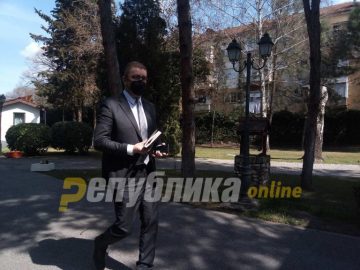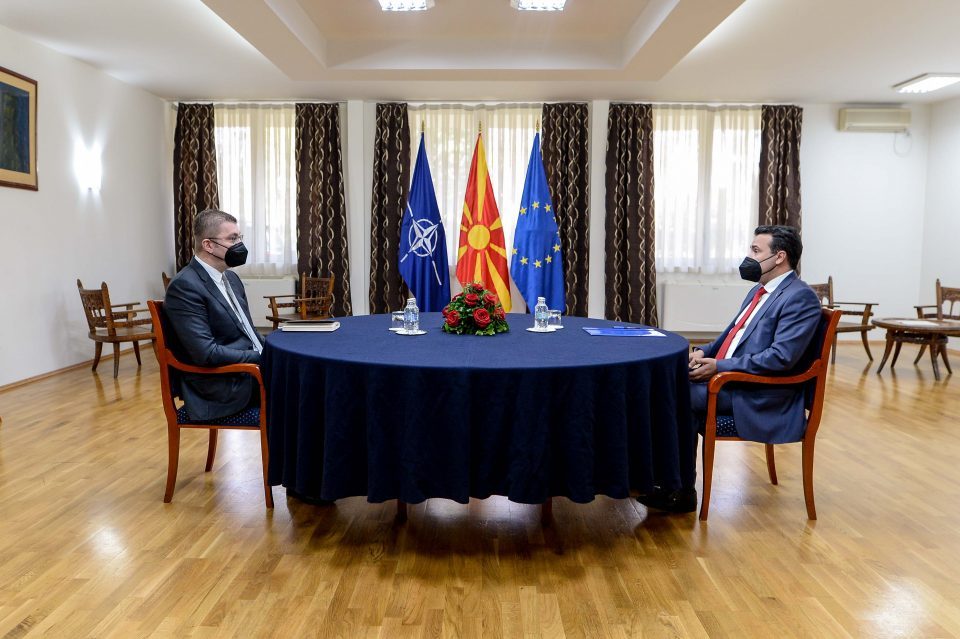Hristijan Mickoski and Zoran Zaev, leaders of the two main parties VMRO-DPMNE and SDSM, reached an arrangement to postpone the census for September and to use fingerprint devices to ensure the veracity of the municipal elections in October. With this, Zaev accepted the two key demands that Mickoski put before him.
Other issues that were discussed during the meeting of the two party leaders today is the VMRO request that the Macedonian diaspora is allowed to vote outside of the embassies and consulates for general and presidential elections – which should boost its otherwise low turnout.
But the main issue was the political crisis caused by Zaev’s insistence that the in-person portion of the census begins next week, despite the exceptionally high infection levels during the current Third Wave of the epidemic. VMRO insisted that the census, which has been postponed since 2011, must not take place in the midst of the epidemic.
We reached an agreement that the census is postponed. It will take place in September, likely between the 5th and 30th of September. The application for online registration of the emigrants will remain active until then. The municipal elections will take place in the second half of October, Mickoski said.
Extending the period of online registration would allow ethnic Macedonians to reconsider their boycott and register in the census. So far, the Albanian diaspora has been using the controversial idea to register the emigrants in the census to the full extent, while the ethnic Macedonian emigrants – who are dismayed with the Zaev regime, chose to boycott his census. Zaev said that part of the agreement reached today is that VMRO will call on the Macedonian diaspora to register in the census. some security guarantees will be added to ensure the accuracy of the census as well. Zaev said that emigrants who renounced their Macedonian citizenship will not be counted in the census. His First Deputy Prime Minister Artan Grubi recently told the Albanian diaspora in Germany, Austria and other countries that do not allow dual citizenship, that they can register even if they renounced the Macedonian citizenship.
Mickoski said that Zaev also accepted a key request from the opposition that fingerprint devices are used in the municipal elections – as the law provides. Zaev was trying to avoid this obligation, apparently hoping that the will be able to repeat the voting irregularities his regime instigated during the 2018 referendum and in the subsequent elections in 2019 and 2020. In all instances, mass ballot stuffing was reported in the ethnic Albanian parts of the country – benefiting Zaev’s candidates and those of his Albanian coalition partners.

Another VMRO request that Zaev accepted is that during the October municipal elections the mayors are elected in the first round – if there is sufficient turnout. This would eliminate the need for a second round of the elections and reduce exposure to the coronavirus.
Zaev said that he agreed to allow broader access to voting for the diaspora. The ethnic Macedonian diaspora largely supports VMRO, and SDSM has in the past tried to restrict its right to vote. Currently the emigrants can vote only in embassies and consulates, making this almost impossible in large countries like the US, Canada or Australia. Voting through other means, such as online or with mail in ballots, would allow this segment of the diaspora to actually vote in the general and presidential elections.
The two leaders also discussed other changes to the electoral model. Zaev wants preferential voting, while VMRO demands the introduction of a first-past-the-post model. Zaev said that this issue will be discussed further.
Mickoski also made another announcement – that the opposition will be constructive in Parliament. This could mean helping the ruling “majority” gather the 61 votes needed to hold a session of Parliament. Zaev has only 62 votes and his coalition is often unable to even convene the Parliament.




Comments are closed for this post.